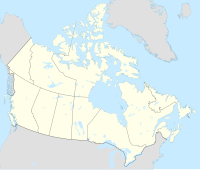Duck Lake, Saskatchewan
Town of Duck Lake | |
|---|---|
Town | |
 Duck Lake Town Office | |
| Coordinates: 52°48′44″N 106°13′34″W / 52.81222°N 106.22611°W[1] | |
| Country | Canada |
| Province | Saskatchewan |
| Rural municipality | Duck Lake |
| Post office established | 1879 |
| Village Incorporated | 1898 |
| Town Incorporated | 1911 |
| Government | |
| • Mayor | Donna Piche |
| • Town Administrator | Michelle Zurakowski |
| • Governing body | Duck Lake Town Council |
| Area (2021)[2] | |
| • Land | 2.38 km2 (0.92 sq mi) |
| Population (2021)[2] | |
• Total | 579 |
| • Density | 243.3/km2 (630/sq mi) |
| Time zone | UTC−06:00 (CST) |
| Postal code | S0K 1J0 |
| Area code | 306 |
| Highways | Highway 11 Highway 212 |
| Website | Official Site |
| [3][4] | |
Duck Lake is a town in the boreal forest of central Saskatchewan, Canada. Its location is 88 kilometres (55 mi) north of Saskatoon and 44 kilometres (27 mi) south of Prince Albert on Highway 11, in the Rural Municipality of Duck Lake No. 463. Immediately to the north of Duck Lake is the south block of the Nisbet Provincial Forest.
The First Nations people are Cree and the band government of the Beardy's and Okemasis' Cree Nation is located here.
Duck Lake was home to one of the last operating schools in the Canadian Indian residential school system, the St. Michael's Indian Residential School (Duck Lake Indian Residential School), which closed in 1996.
History
[edit]Duck Lake (French: Lac-aux-Canards) was one of the five Southbranch Settlements settled by French-speaking Métis from Manitoba in the 1860s and 1870s. A Roman Catholic Mission was established in Duck Lake in 1874 by Father André O.M.I. and by 1888 the village had a school, a post office (called Stobart), a flour mill (gristmill) and a trading post. From 1882 to 1905 Duck Lake was within the District of Saskatchewan, one of several districts of the Northwest Territories.[5]
In 1885, Duck Lake was the site of the Battle of Duck Lake, a conflict between Métis warriors and the Government of Canada, at the start of the North-West Rebellion. At Duck Lake, the Prince Albert Trail, which ran from Regina to Prince Albert, crossed the Carlton Trail and it marked the halfway point between the Métis headquarters at Batoche and the North-West Mounted Police at Fort Carlton.[6]

Historic Carpenter Gothic style All Saints Anglican Church built in 1896 is a municipal heritage site. Its historic cemetery contains the graves of some of those who fought in the Battle of Duck Lake as well as those of other pioneers of the community.[7]
The 1973 western Alien Thunder was partially filmed here.[citation needed]
Demographics
[edit]In the 2021 Canadian census conducted by Statistics Canada, Duck Lake had a population of 579 living in 202 of its 232 total private dwellings, a change of 1.8 per cent from its 2016 population of 569. With a land area of 2.38 km2 (0.92 sq mi), it had a population density of 243.3/km2 in 2021.[2]
| 2021 | 2011 | |
|---|---|---|
| Population | 579 (+1.8% from 2016) | 577 (-4.6% from 2006) |
| Land area | 2.38 km2 (0.92 sq mi) | 2.73 km2 (1.05 sq mi) |
| Population density | 243.3/km2 (630/sq mi) | 211.6/km2 (548/sq mi) |
| Median age | 36.0 (M: 35.2, F: 36.4) | 41.2 (M: 41.1, F: 41.2) |
| Private dwellings | 232 (total) 202 (occupied) | 227 (total) |
| Median household income | $65,500 |
Notable people
[edit]- Gabriel Dumont - Leader of Métis forces in the North-West Rebellion 1885.
See also
[edit]References
[edit]- ^ "Duck Lake". Geographical Names Data Base. Natural Resources Canada.
- ^ a b c "Census Profile, 2021 Census of Population Duck Lake, Town (T): Saskatchewan [Census subdivision]". Statistics Canada. 9 February 2022. Retrieved 1 April 2022.
- ^ National Archives, Archivia Net. "Post Offices and Postmasters". Archived from the original on 6 October 2006. Retrieved 25 September 2013.
- ^ Government of Saskatchewan, MRD Home. "Municipal Directory System". Archived from the original on 15 January 2016. Retrieved 25 September 2013.
- ^ Henry Thomas McPhillips (1888), McPhillips' alphabetical and business directory of the district of Saskatchewan, N.W.T.: Together with brief historical sketches of Prince Albert, Battleford and the other settlements in the district, 1888 (pages 93-97), Prince Albert, NWT: Henry Thomas McPhillips
- ^ "Canadian Plains Research Center Mapping Division" (PDF). Retrieved 13 September 2013.
- ^ Canada's Historic Places: All Saints Anglican Church
- ^ "2021 Community Profiles". 2021 Canadian census. Statistics Canada. 4 February 2022. Retrieved 19 October 2023.
- ^ "2011 Community Profiles". 2011 Canadian census. Statistics Canada. 21 March 2019. Retrieved 25 September 2013.
- ^ "2006 Community Profiles". 2006 Canadian census. Statistics Canada. 20 August 2019.
- ^ "2001 Community Profiles". 2001 Canadian census. Statistics Canada. 18 July 2021.
Further reading
[edit]- Barnholden, Michael. (2009). Circumstances Alter Photographs: Captain James Peters' Reports from the War of 1885. Vancouver, BC: Talonbooks. ISBN 978-0-88922-621-0.


